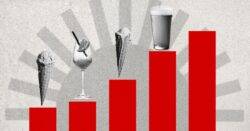The cost of our summer essentials is still going through the roof and means people will be clinging onto their last pounds during a heatwave (Picture: PA/ Getty)
A money-saving expert has explained why Brits are still feeling the crunch despite inflation hitting its lowest in the last eight months.
Figures from the Office of National Statistics (ONS) show that the price of some shopping basket essentials is continuing to rocket despite inflation decreasing.
Earlier today the latest data showed that rate of CPI decreased to 8.7% in April from 10.1% in March.
But the rate at which grocery prices rose slowed marginally in the year to April, but at 19.1% is close to historic highs.
Liz Edwards, editor-in-chief of personal finance comparison site Finder.com spoke to Metro.co.uk and gave her thoughts on what this means for the UK economy and consumers.
She said: ‘Despite inflation falling from 10.1% in March to 8.7% in April, the UK economy still has a long way to go until it’s out of the woods, particularly if the government is still hoping to reach its target of halving inflation by the end of 2023.
‘Although inflation has finally started to waver, the bad news is that it has only fallen very slightly when it comes to food and non-alcoholic beverages, with the 12-month inflation rate falling from 19.2% in March to 19.1% in April.
The price of a tin of baked beans has now risen more than 40% and costs more than £1 (Picture: Getty)
Our graph shows just how much some of the household essentials have risen (Picture: Metro.co.uk)
‘These rates are still unprecedentedly high, and this will continue to put a huge amount of pressure on the disposable income of UK households.
‘The fall in consumer price inflation announced today could also indicate that the most recent increase to the UK base rate might have been the last. This month we saw the Bank of England’s Monetary Policy Committee raise the base rate to 4.5%, the highest it’s been in almost 15 years.
‘However, it now seems as though the Bank of England may have finally won a round in its battle against sticky inflation, and as a result we could now see rates hold, or even fall, in the next MPC meeting.
‘Despite costs generally starting to seem less bleak for the British consumer, households shouldn’t start loosening their purse strings just yet.
‘With mortgage rates on the rise, the cost of food still extraordinarily high, and real wages falling, consumers will need to continue being as savvy as they can with their personal finances.”
(Picture: Metro.co.uk)
Speaking about how lower inflation can benefit those in most need Liz said that people shouldn’t get too carried away.
She said: ‘It’s worth remembering that the drop in the CPI inflation rate from 10.1% in March 2023 to 8.7% in April doesn’t mean that prices are falling. It just means that prices generally aren’t rising as fast as they were. Food inflation remains stubbornly high, dropping only slightly from 19.2% in March to 19.1% in April.
‘The numbers come from the Office for National Statistics, which bases them on a basket of goods that reflects what most people across the UK are buying. Olive oil, eggs, and sauces and spices have seen the largest annual price rises.
‘Slower price rises in energy bills are a factor in the fall of the overall figure, because a steep price rise that happened in April last year has now dropped out of the annual comparison. And drivers are benefitting from a drop in fuel prices – average petrol and diesel prices were down to 145.8p and 162.4p a litre respectively in April 2023 vs 161.8p and 176.1p a litre in April 2022.
There have been some staggering jumps in inflation over the past 2 years, and this latest figure is the steepest drop we’ve seen since the cost of living crisis started. But overall the “benefit” is relative – many prices are still rising, just not as quickly as they were.
The rise in inflation is still hitting supermarkets hard as food prices are continuing to rocket (Picture: Getty Images)
She added: ‘The impact of inflation at 8.7% in April 2023 means, in general, that something which cost £1 in April 2022 is now costing us nearly £1.09.
‘Meanwhile, wages haven’t kept pace with that, which puts a squeeze on household budgets.
While prices in many sectors have risen, the cost of food and non-alcoholic drinks rose at the second highest rate in 45 years, in the year to April 2023, at 19.1%.
This is only slightly lower than in March, showing that food prices continue to soar.
Liz predicts bad news for restaurants and catering businesses and events over the summer, and that they could be hit hardest by food prices.
She used restaurant chain Prezzo as an example, after it closed 46 of its restaurants just last month.
Liz said: ‘During this cost-of-living crisis, the average debt per person has been growing. And a recent study by KPMG found that around half of consumers have cut back on “non-essential spending” – the most common being eating out.
‘Inflation has hit restaurants hard from both sides – fewer people eating out, and food costs rising.
‘We may see many more restaurants closing this year as a result. Only last month, Prezzo closed 46 of its restaurants, putting hundreds of jobs at risk, and it blamed inflation in food and energy prices.
‘The chief economist at the ONS said today that a lot of supermarkets have fixed contracts which can take 6 or 12 months to “roll off”.
The cost increase of your average shopping basket
Olive oil 500ml-1litre £5.95 £4.07 46% rise
Broccoli per kg £2.38 £1.66 44% rise
Baked beans 400-425g £1.07 £0.76 41% rise
Cheddar cheese per kg £9.42 £6.76 39% rise
Eggs per dozen £3.29 £2.40 37% rise
Carrots per kg £0.66 £0.50 32% rise
White sliced bread 750-800g £1.39 £1.08 28% rise
Butter 250g £2.34 £1.83 28% rise
Non-dairy milk drink 900ml-1litre £1.84 £1.48 25% rise
Dry spaghetti or pasta 500g £1.06 £0.87 22% rise
Frozen fish fingers pack of 8-12 £2.98 £2.46 21% rise
Cauliflower each £1.09 £0.90 21% rise
Chilled ready meal (fish/veg) serves 1 £3.30 £2.75 20% rise
Bananas per kg £1.12 £0.93 20% rise
Multipack crisps £1.63 £1.38 18% rise
Breakfast cereal (gluten free) £2.46 £2.09 18% rise
Small box of tea bags(230-250g) £2.48 £2.12 17% rise
Canned fruit 400-450g £1.14 £1.00 14% rise
Beef mince per kg £8.09 £7.12 14% rise
Powdered baby formula 400-900g £12.29 £10.92 13% rise
Instant coffee 90-100g £3.37 £2.98 13% rise
Basmati rice 500g-1kg £2.08 £1.84 13% rise
Bitter 4 cans (440-500ml) £4.70 £4.23 11% rise
Large chocolate bar £1.64 £1.49 10% rise
Fizzy drink 500ml £1.67 £1.52 10% rise
Cans of lager 10-24 cans (440-500ml) £12.61 £11.42 10% rise
Baking potatoes per kg £0.84 £0.76 10% rise
Avocados each £0.95 £0.88 7% rise
Blueberries per kg £12.22 £11.51 6% rise
‘He said that as those contracts expire you would expect them to be renegotiated at lower prices, for any goods that are falling in price, but this could take some time for us to see it reflected in prices consumers are paying.’
But it isn’t all doom and gloom, and food prices could start to drop in the next few months, the expert told Metro.co.uk.
She said: Food prices already reflect inflation. The numbers come from the Office for National Statistics, which bases them on a basket of goods that reflects what most people across the UK are buying.
‘The British Retail Consortium, the body that represents shops in the UK, predicts that food prices will start to fall “in the coming months” due to a cut in wholesale prices “and other cost pressures” filtering through.
‘The Bank of England expects inflation to fall quite sharply during 2023. One of the factors it cites is that, as people have less money to spend, there will be “less demand for goods and services in the UK”.
‘It says there are signs that inflation has turned a corner.
‘Many households will be counting on this, while they continue to watch the pennies and cut back on non-essentials.’
Get in touch with our news team by emailing us at webnews@metro.co.uk.
For more stories like this, check our news page.
Liz Edwards, editor-in-chief of personal finance comparison site Finder.com spoke to Metro.co.uk.





